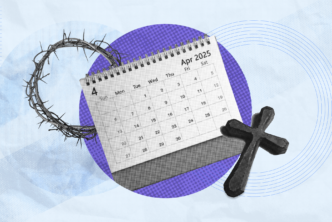Today we celebrate Epiphany, one of the oldest Christian feast days,1 which remembers the magi’s journey as they followed the star of Bethlehem in search of the foretold King of kings. It’s also known as the “Twelfth Day” because it occurs 12 days after Christmas.
Epiphany means “appearance” or “manifestation,” aptly describing what the magi would find once the star “stopped over the place where the child was” (Matt 2:9 NIV).
In this excerpt, adapted from A Light Has Dawned, Kent R. Hughes contemplates the magi’s story—and what we can learn from them.
***
Now after Jesus was born in Bethlehem of Judea in the days of Herod the king, behold, magi from the East arrived in Jerusalem, saying, “Where is he who has been born King of the Jews? For we saw his star in the East, and have come to worship him.” (Matt 2:1–2 NASB)
Whether riding camels or not, [the magi] must have been an impressive sight—for they were wealthy, noble Persians, bearing not only their great gifts but the dust of a thousand miles. But what really electrified everyone was that these gentiles were looking for a newborn Jewish king! They dramatize for our imaginations and hearts what was always implicit in biblical history—the Christ was for gentiles, too.
What an example, then, the magi set in seeking Christ. Traveling in ancient times was miserable. The exposure and the danger from criminals shortened many lives. But these men came because they believed. No obstacle was too great.
Evidently, the Magi’s arrival in Jerusalem was a public event. Matthew describes what happened: “And when Herod the king heard it, he was troubled, and all Jerusalem with him.”
King Herod was “all shook up,” for the literal sense of the word translated “troubled” is “to shake” or “to stir.” The only other place the word is used in Matthew is 14:26, where it describes the fright of the disciples when they see Jesus coming toward them on the sea like a water-walking ghost. The Greek version of the Old Testament uses this word to describe Belshazzar’s fright at seeing the handwriting on the wall (Dan 5:9). The King James Version says, “his joints were loosed and one knee smote the other.”
Herod, then, did not have a mild case of the jitters—this was theatrical in scope. And Herod’s psychological imbalance further complicated the scene. He was crazy, having previously murdered his own two sons and his wife, Miriamne (she because he couldn’t bear the thought of his dying first and her living without him). No wonder all Jerusalem was “shook up.” No one could guess what cruel extremes he would go to next. Terror reigned in the Holy City.
In his fright, Herod called for the help of the religious establishment:
And gathering together all the chief priests and scribes of the people, he began to inquire of them where the Christ was to be born. And they said to him, “In Bethlehem of Judea; for so it has been written by the prophet, ‘And you, Bethlehem, land of Judah; are by no means least among the leaders of Judah; for out of you shall come forth a Ruler, who will shepherd My people Israel.’” (Matt 2:4–6 NASB)
The answer was easy; even the common people knew it (cf. John 7:41–42). Micah 5:2 had predicted some 700 years before that the Messiah would be born in Bethlehem. Here the officials paraphrase the ancient prophecy and add a final line from 2 Samuel 5:2, “who will shepherd my people Israel,” which in its context emphasizes that this one born in Bethlehem will be of the house of David. Everyone knew the answer!
And this fact sets up a supreme irony, which Matthew wants us to see: though these religious leaders knew exactly where the Christ was to be born, none of them went along with the magi to see if it was so. They illustrate the amazing apathy to which religious people—those who have it all, have heard it all, and can recite it all—can fall into. The scribes knew the Scripture inside out. They even numbered the letters and lines to ensure careful copying. Yet Jesus said of them:
You search the Scriptures, because you think that in them you have eternal life; and it is these that bear witness of me; and you are unwilling to come to me, that you may have life. (John 5:39–40)
It is so easy to become this way. It is a special temptation for preachers. We can be like flight announcers at the airport who, by virtue of the fact that they are constantly announcing destinations, come to believe they have been there themselves. Knowledge and words just don’t do it.
Let’s go back to Herod. He may have been crazy, but he was sly as a fox. So he dismissed the religious leaders and arranged to see the magi:
Then Herod secretly called the magi, and ascertained from them the time the star appeared. And he sent them to Bethlehem, and said, “Go and make careful search for the Child; and when you have found him, report to me, that I too may come and worship him.” (Matt 2:7–8 NASB)
Nothing could be lower than Herod’s pious pretense masking his murderous intent. No doubt he would have killed them all—the child, the parents, and the unsuspecting magi—if they had followed through as they planned with his orders.
Mercifully, that was not to be:
And having heard the king, they went their way; and lo, the star, which they had seen in the East, went on before them, until it came and stood over where the child was. And when they saw the star, they rejoiced exceedingly, with great joy.” (Matt 2:9–10 NASB)
The star reappeared. It stood stationary over a humble home—and then the magi began to rejoice. We do ourselves a disservice if we limit their rejoicing to prim, restrained smiles. They rejoiced like Middle Easterners—noisy and exuberant! With excitement they dismounted, uncovered their gifts, straightened their robes and turbans, and stepped toward the entrance. I love Luther’s suggestion that the humble dwelling was probably a great trial to the magi. Had they come thousands of miles to this—a poor peasant’s home outside the big city? It is a credit to their faith that they went in:
And they came into the house and saw the child with Mary his mother; and they fell down and worshiped him; and opening their treasures they presented to him gifts of gold and frankincense and myrrh. (Matt 2:11 NASB)
There are three things we must not overlook in this climactic verse:
1. The Magi ‘fell down’
First, the magi “fell down”; they did not sit up. They knelt to the ground before the child—perhaps they even lay prone before him, expressing the inward prostration of their hearts. The picture is remarkable, and even more remarkable when we realize that these are gentiles bowing before a Jew—and a baby at that!
2. The Magi ‘worshiped’ Jesus
The picture is intensified by the additional phrase, which says they “worshiped him.” The word literally means “to kiss toward,” as pagans would kiss the ground before their idols. Here it bears the idea of intense adoration. They adored the Lord Jesus! All of their being was extended toward him. Think of how the sight must have affected Joseph and Mary. No doubt they flushed warmly as they watched.
3. The Magi gave the best they had
Last, they “presented to him gifts of gold and frankincense and myrrh.” Much has been made of the typology of these gifts, and much of it is sentimental and inaccurate. Matthew simply wants us to see that they gave Jesus highly expensive gifts: gold, which has always been one of the rarest and most expensive of metals; frankincense, a much-valued incense extracted from the bark of trees; and myrrh, a coveted spice and perfume. They were, indeed, gifts fit for a king. The magi gave the best they had. True worship always involves giving what we have, the very best of ourselves and possessions, to Christ.
The story of the magi concludes with a beautiful, forthright presentation of the primacy of worship. It will never change. [Epiphany] is a call to worship, to prostrate ourselves before Jesus. To kiss the Son, to adore him. To give him our best.
I urge you therefore, brethren, by the mercies of God, to present your bodies a living and holy sacrifice, acceptable to God, which is your spiritual service of worship. (Rom. 12:1 NASB)2
***
This post is adapted from the January 6 entry by Kent R. Hughes in A Light Has Dawned: Meditations about Advent and Christmas, available from Lexham Press.
- https://www.timeanddate.com/holidays/us/epiphany
- Christianity Today, A Light Has Dawned: Meditations of Advent and Christmas (Lexham Press, Bellingham, WA), 2020.







